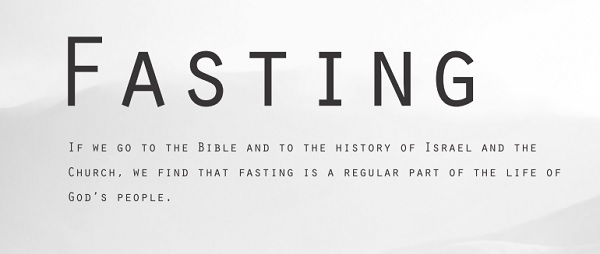Fasting
By Derek Prince

Under the Old Covenant, Israel was required by God to fast at least once a year collectively on the Day of Atonement and on other occasions. We also have records of individuals who fasted: Moses fasted, David fasted, Elijah fasted and many of the kings of Israel fasted and led their people in fasting.
In the book of Acts, we have a record of the early Church fasting together in groups for special needs—particularly when they were sending forth apostles—and also when they were appointing elders in local churches. Reliable Church tradition and history also tell us that for several centuries the early Church practiced fasting regularly on Wednesday and Friday of each week. Since that time, there have been many movements and groups which have recognized the need for fasting.

PREPARING FOR A FAST
The mental attitude with which we go into a fast is crucial, and has a great deal to do with whether the fast is successful or not. I believe we should approach fasting with an attitude of positive faith: it is God’s will for me to fast and God will bless me when I do fast in accordance with his will.
I believe it is God’s will for us to fast because Scripture reveals that it is the will of God. We do not need some special feeling or revelation about the fact that fasting is the will of God, because the Bible clearly indicates that it is. We do not need some special revelation that it is God’s will for us to pray because it is plainly taught in the Bible. People who wait for a special revelation for something that is revealed in the Bible seldom get that special revelation and therefore miss the purpose of God.
I believe as well that God will reward us in fasting if we seek him with right motives and in a scriptural way. The Bible clearly promises this. In Matthew 6:17–18 Jesus says:
But thou, when thou fastest, anoint thine head and wash thy face; that thou appear not unto man to fast, but unto thy Father which is in secret, and thy Father, which seeth in secret shall reward thee openly.
That is a very clear promise. If you fast in the right way with the right motives, God will reward you openly. If you fail to fast, bear in mind that you are depriving yourself of the reward, because God cannot give you the reward if you don’t meet the condition. He may not always reward you exactly the way you expected to be rewarded, but there will never fail to be a reward for those who diligently seek God.

In Isaiah chapter 58, we also have a series of promises to those who fast according to the will of God. It is worthwhile to look at some of these. All these results will follow if fasting is done in a way pleasing to God:
Then shall thy light break forth as the morning, and thine health shall spring forth speedily: and thy righteousness shall go before thee; the glory of the Lord shall be thy reward. Then shalt thou call, and the Lord shall answer; thou shalt cry and he shall say, Here I am. And the Lord shall guide thee continually, and satisfy thy soul in drought, and make fat thy bones; and thou shalt be like a watered garden, and like a spring of water, whose waters fail not. And they that shall be of thee shall build the old waste places: thou shalt raise up the foundations of many generations; and thou shalt be called, The repairer of the breach, The restorer of the paths to dwell in (vv. 8–9, 11–12).
Here is a list of ten specific promises from this passage for those who fast according to the will of God: 1) light; 2) health; 3) righteousness; 4) glory; 5) answered prayer; 6) continual guidance; 7) satisfaction; 8) refreshing; 9) work that endures; and 10) restoration. They are specifically promised to those who fast in accordance with the will of God. When we begin to fast with a positive attitude of faith that we are doing what the Scripture teaches, that we are obeying the revealed will of God, and that God himself will reward us, then we can expect the specific rewards that are listed in Isaiah.
We also need to have the right attitude toward our own bodies. Many Christians have a wrong attitude toward the body. They have the impression that the body is a necessary evil they have to live with and that it will be a good thing when they are free of it. In the meanwhile, they don’t want to give too much thought or time to the body because they think that would be “unspiritual.” But the Bible never teaches that attitude toward the body. In 1 Corinthians 6:19–20, we read:
What? Know ye not that your body is the temple of the Holy Ghost which is in you, which ye have of God, and ye are not your own? For ye are bought with a price: therefore glorify God in your body, and in your spirit, which are God’s.
The Bible teaches that our physical body is the temple of the Holy Spirit, and that when Jesus died on the cross and shed his blood, he redeemed not merely our spirits and our souls, but our bodies as well. He bought the whole of us with the price of his shed blood, and we belong to him entirely—spirit, soul and body. He has a very real interest in our bodies and a very specific purpose for them. My body is to be the temple of the Holy Spirit, the place where he dwells. God wants me to keep that residence in the best possible condition. It should be healthy and strong and able to do the things God wants done.
In Romans 6:13 Paul says this about our physical members:
Neither yield ye your members as instruments of unrighteousness unto sin: but yield yourselves unto God, as those that are alive from the dead, and your members as instruments of righteousness unto God.
The various members of my physical body are intended to be instruments (or the alternative reading in the margin is “weapons”) that God can use. They do not belong to me; they belong to God. I am to yield them to God. I think it is logical to assume that God wants his weapons in good condition, not feeble and broken down. He wants our bodies to be healthy. He wants our members to be strong, effective and active because they are the members of Christ and they are the instruments that God uses for his purposes on the earth.
Fasting is a very practical way to make and keep our bodies healthy. I believe that many physical and other problems would be solved if Christians would learn to fast in a practical and healthy way. When I look at the way Christians in America treat their bodies—especially the kind of things they feed them—I ask myself, “What shape would their cars be in if they treated them with as little understanding and respect as they treat their bodies?” I have come to the conclusion that most people’s cars wouldn’t be running! We simply don’t appreciate the importance of a healthy body.

THE PURPOSE OF FASTING
Somebody said once, “If you aim at nothing, you can be pretty sure you’ll hit it.” We need an aim or objective when we fast. The Scriptures provide many good reasons for fasting.
First of all, one scriptural purpose for fasting is to humble myself. David said, “I humbled my soul with fasting.” God will not humble us because he has told us to humble ourselves. I have proved by experience that if I fast with the right motive, and in faith, I can humble myself—and when I humble myself, God exalts me. That principle runs throughout the Bible. Everyone who exalts himself shall be abased and everyone who humbles himself shall be exalted. We must make the choice. Do I want to be abased? Then I can exalt myself. Do I want to be exalted? Then I need to humble myself. I believe that the basic, scriptural way for a believer to humble himself is by fasting.
Another motive for fasting is to come closer to God. The Scripture says if we draw nearer to God, he will draw nearer to us.
A third reason for fasting is to understand God’s Word. I have learned by experience over the years that in times of fasting and seeking God, he gives me further and deeper understanding of his Word.
Yet another very important reason for fasting is to find God’s will and to receive direction in my life. Ezra said, “I proclaimed a fast there, at the river of Ahava, that we might afflict ourselves before our God to seek a right way for us, and for our little ones and for all our substance” (Ezra 8:21). Again, it has been my experience that when I humble myself in fasting and seek God for direction and guidance, he does lead me in the right way.
Another very common reason for fasting is to seek healing. Isaiah 58:8 says, “Thine health shall spring forth speedily.” This also applies to deliverance from evil spirits. Jesus said in one place about a certain type of evil spirit, “his kind goeth not out but by prayer and fasting.” Even before Jesus himself entered into his ministry of healing and deliverance, he spent forty days fasting.
We also may fast when we need God’s intervention in some particular crisis or problem which we cannot handle by ordinary means. The Bible has many examples of this. In 2 Chronicles chapter 20, Jehoshaphat and the people of Judah found that they were facing an invading army which they could not meet with normal military methods. They humbled themselves before God, gathered together, fasted and prayed—and God dealt with the invading army. They never had to use a single weapon. God totally defeated their enemies for them. I don’t believe God has any favorites—he’s just as willing to intervene on our behalf when we seek him in the same way.
One more reason for fasting is to intercede for others. Many people come to me about their unsaved relatives and ask, “What can I do to help them find salvation?” I often ask them, “Have you ever fasted and prayed for your unsaved husband or your unsaved son or daughter? Are you willing to make a personal sacrifice to do something that will cost you—on behalf of your loved one?” Many believers will affirm that God has answered prayer accompanied by fasting on behalf of unsaved relatives.
If you are planning a special period of fasting—more than a day or so—or you have some special purpose for fasting, sometimes it is good to make a written list of what you are fasting about and date it. I am glad that many years ago in the early 1950s I made such a list on several occasions. I still have the lists, and in looking back over them I see with amazement how many of the things that I fasted for God answered—and some of them were great things. To give you one example, I fasted and prayed for the salvation of my mother, and though it took many years, God saved her very definitely and dramatically almost at the last moment. At about the last time I could be assured she really understood the gospel, she had a tremendous experience of salvation.
When I look back on those lists now, I praise God for his marvelous answers to prayer. A prayer list might be a good idea in your ordinary prayer life as well. Not everyone necessarily needs to do it—but if you do, one day you’ll praise God for the way he has answered your prayers.
PHYSICAL ASPECTS OF FASTING
In regard to physical aspects of fasting, some people should exercise caution. If you have certain types of physical problems such as diabetes or tuberculosis, or if you are on some kind of regular medication, you should consult your physician and get his advice about whether or not you should fast. There are some people who cannot practice fasting. In such cases, I believe that it is the responsibility of other Christians to fast for those who cannot.
Several things will help you achieve the maximum physical benefits from your fast. First, get plenty of rest. In fact, take extra time to rest. You can pray just as well lying in your bed as you can on your knees.
Second, get some exercise and fresh air. I find it easy to pray when I walk, and when I am walking, I am getting fresh air and exercise as well—all three at once! Exercise greatly increases both the spiritual and physical benefits of the fast.
A third thing to remember while you are fasting is that it is normally wise to consume plenty of fluids to flush out your kidneys and generally clean out your body. What kind of fluids? I believe that the best thing is pure water—not the water that comes out of the tap, but the purified water available in the supermarket or from a firm that handles it.
When you fast you will invariably notice that your sense of taste becomes much keener, and you will discover all sorts of bad tastes in the drinking water which you hardly noticed when you were eating—particularly the taste of chlorine. Although I strongly feel that it is wise to take just pure water, at the beginning of your fast you may want to put some honey in the water. Drink the water hot with a little lemon. Honey and lemon together are purifying.
If you don’t want to drink only water, other good fluids for drinking are broth, bouillon and fruit juices. I would personally advise people who are fasting not to drink tea or coffee since they both are strong stimulants. You will receive more physical benefits from your fast if you avoid these.
In most people’s experience of fasting, the unpleasant physical effects come to a climax on the second, third or fourth day. Beyond that time you come into a period where fasting becomes exciting, exhilarating and enjoyable. If you get that far you may find that your physical strength increases in a remarkable way. My experience—not so much in physical as in mental activity—is that when I get to this stage in a fast, I can do in one hour work that would normally take me two or three hours. My mind is much clearer, although my body may still be protesting a little with a sense of weakness.

DURING THE FAST
During a fast, I very strongly recommend that you take extra time for Bible reading and for prayer. I put Bible reading first because, in my opinion, it is wise to make it a practice not to pray without first reading your Bible. When you read your Bible, it anoints your spirit and gets your mind in line with God. Your prayer will normally be much more effective after Bible reading. If you are just fasting a couple of meals, you may feel that you do not have much time—but after all, you have the time you would normally spend on two meals. So offer that time to the Lord. Spend that time (and more if possible) specifically in Bible reading and prayer.
You must also guard against spiritual attack. The real sacrifice in fasting is not going without food; it is the spiritual battle. When you truly begin to seek God, praying and fasting for things that matter, Satan is going to turn extra spiritual forces loose against you.
You will find that strange oppressions begin to come over you: doubt, fear, or loneliness. You may somehow feel yourself in a dark place, or you may lose some of the usual feelings of joy, peace and happiness that you normally have as a Christian. Don’t be worried if that happens. In fact, it’s a kind of back-handed compliment from the devil. It means that you are worrying him, and he is out to prevent you from going through with your objectives. Don’t yield to these emotions. Don’t let feelings dictate to you. Bear in mind the great basic truths of the Word of God: God is on your side; God loves you; God is a rewarder of those who diligently seek him. This is true whether you feel it or not. Don’t let feelings turn you away.
Another caution I would give is to avoid religious ostentation. Jesus says in Matthew 6:16, “Moreover, when ye fast, be not, as the hypocrites, of a sad countenance: for they disfigure their faces, that they may appear unto men to fast. Verily I say unto you, they have their reward.” Don’t put on a religious act. Don’t let everyone know that you are fasting. Some people will have to know, but don’t make a show of it. Do it as quietly and as unostentatiously as possible.
Fasting is both our duty and our privilege as Christians. Let us heed God’s call to pray and fast, individually and corporately, trusting him that he will fulfill his promise to reward those who diligently seek him.


 Derek Prince (1915-2003) was educated at Britain’s finest universities. While serving in the British army during World War II, he experienced a life-changing encounter with Jesus Christ. He then devoted his life to the teaching and study of the Bible and became internationally recognized as a leading authority on Bible prophecy. His daily radio program continues to touch lives around the world. Learn more at www.derekprince.org.
Derek Prince (1915-2003) was educated at Britain’s finest universities. While serving in the British army during World War II, he experienced a life-changing encounter with Jesus Christ. He then devoted his life to the teaching and study of the Bible and became internationally recognized as a leading authority on Bible prophecy. His daily radio program continues to touch lives around the world. Learn more at www.derekprince.org.